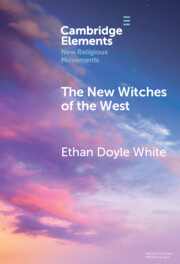Refine search
Actions for selected content:
2 results

Gerald Gardner and the Creation of Wicca
-
- Published online:
- 10 October 2025
- Print publication:
- 30 October 2025
-
- Element
- Export citation

The New Witches of the West
- Tradition, Liberation, and Power
-
- Published online:
- 02 February 2024
- Print publication:
- 22 February 2024
-
- Element
- Export citation
